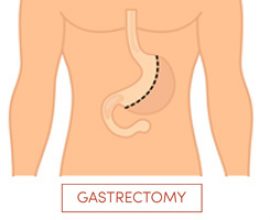Diabetes & Sleeve Surgery

It’s no secret that diabetes often becomes a growing health concern when individuals are carrying excess weight. According to a Harvard study, people who are obese may be as much 60-times as likely to develop diabetes as those who are within normal weight ranges. While weight loss surgery isn’t meant to be a treatment for diabetes, one of the many advantages of losing significant weight is the improvement of conditions like diabetes. In fact, diabetic patients who have sleeve surgery (sleeve gastrectomy) have remission rates that can be as high as 60 percent.
Diabetes and Obesity
Approximately 90 percent of all instances of diabetes may be directly linked to obesity or excessive weight. The American Diabetes Association suggests that losing even 10-15 pounds may help reduce problematic symptoms of diabetes. Cutting back on calories and fat and getting more exercise can help achieve this goal. For diabetics who have consistently struggled with weight loss, however, it’s not always that easy to keep even smaller amounts of weight off long enough to enjoy potential health benefits.
How Sleeve Surgery Helps
Sleeve surgery could provide the added incentive to adopt a healthy lifestyle and minimize or eliminate diabetes symptoms. Weight loss procedures like sleeve gastrectomy may help ease or reverse diabetes symptoms in several ways. Adults with type 2 diabetes may have better blood sugar control as weight is lost in the months following sleeve surgery. A study on patients with diabetes who had the sleeve operation found that nearly 80 percent were able to reduce their dependence on diabetes medications. The procedure may also help prevent or reverse diabetes by:
- Improving glucose metabolism
- Changing the way “gut hormones” work in a way that may reduce diabetes risks
- Reducing the absorption of sugars and fats that often lead to blood sugar spikes
Using Weight Loss as an Incentive to Adopt Healthy Behaviors
In a study involving diabetics who had weight loss surgery, those who had the sleeve procedure were 17 times more likely to experience a remission after the operation. Patients may further minimize their risk of having issues with diabetes because of the lifestyle changes that will be necessary to maintain weight loss results on a long-term basis, including:
- Getting more daily exercise
- Eating smaller portion sizes
- Choosing foods with better nutritional value
Sleeve surgery involves the removal of a large portion of the stomach and the creation of a smaller reservoir for food. Prior to surgery, patients who are excessively overweight may be asked to make an attempt to lose some weight to make the operation safer. Efforts will still need to be made to manage diabetes after the surgery, including periodic testing of blood sugar levels, to determine if the condition has improved or gone into remission.
Related Posts
5 Risks of Obesity
How Sleeve Gastrectomy Works
The Advantages of Orbera
Are You a Candidate for Sleeve Surgery?
Contact Info
3420 Bristol St #700, Costa Mesa, CA 92626, USA
Orange Location
1310 W Stewart Dr. Suite 310, Orange, CA 92868, USA
*DISCLAIMER
In compliance with 16 CFR 255 and Federal Trade Commission Guidelines on the use of endorsements and testimonials in the marketing and advertising of websites:
The testimonials, statements, and opinions presented on our website are only applicable to the individuals depicted, and may not be representative of the experience of others. The testimonials are voluntary provided and are not paid, nor were they provided with free products, services, or any benefits in exchange for said statements. The testimonials are not indicative of future results or success of any other individuals. South Coast Specialty Surgery Center cannot and does not guarantee the medical outcome or the results of individuals utilizing the services provided by us or the providers in our network, or from any of the websites we link, or refer to. The testimonials and endorsements found on the site for the benefit of the site or individual services or procedures are, to the best of our knowledge, the true statements and beliefs of the individuals providing them. In short, surgery involves risk, results may vary, and outcomes are not guaranteed.
Some pages of this website may feature a depiction of a model showing emphasis of the torso. Product names may be mentioned in testimonials or elsewhere, and are trademarks or registered trademarks of their respective holders. Please refer to our Terms and Risks of Surgery pages for more information. Gastric Sleeve Surgery Centers performs Gastric Sleeve Surgery in Orange County, San Diego, Los Angeles, Riverside County and other location in Southern
California.




